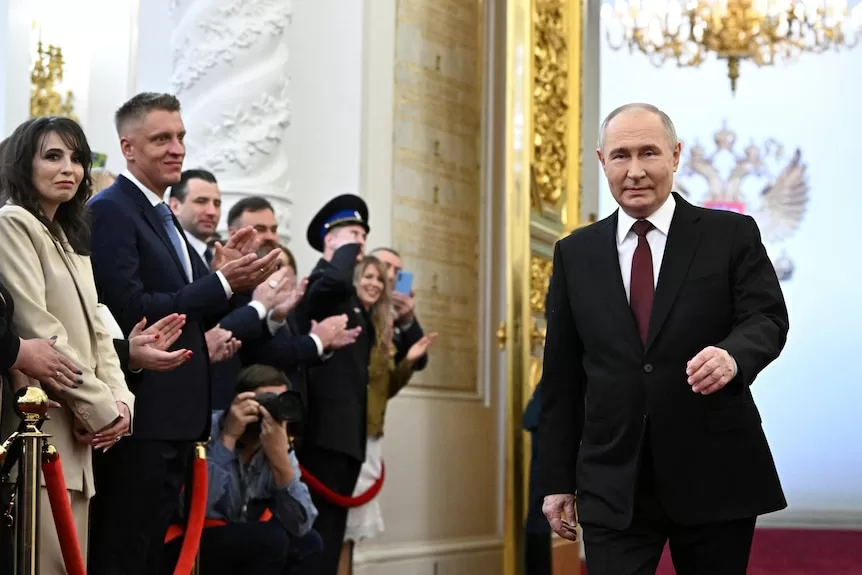Australia has joined a number of other Western nations in boycotting the inauguration of Russian President Vladimir Putin over his country’s war with Ukraine.
Vladimir Putin was sworn in for a new six-year term at a ceremony at the Kremlin in Moscow.
Australia’s ambassador to Russia, John Geering, did not attend the event.
The United States, United Kingdom, Canada and most European Union nations also boycotted the ceremony, though France sent its ambassador.
Mr Putin, in power as president or prime minister since 1999, begins his new mandate more than two years after he sent tens of thousands of troops into Ukraine.
At 71, Mr Putin dominates the domestic political landscape.
On the international stage, he is locked in a confrontation with Western countries he accuses of using Ukraine as a vehicle to try to defeat and dismember Russia.
After being sworn in, President Putin told Russia’s political elite that he was not shutting down dialogue with the West but that it would have to make its own choice about how to engage with his country.
He said talks on strategic nuclear stability with the West were also possible, but only on equal terms.
“We are a united and great people and together we will overcome all obstacles, we will bring to life everything we have planned. Together we will be victorious,” Mr Putin said.
Ukraine said the event sought to create “the illusion of legality for the nearly life-long stay in power of a person who has turned the Russian Federation into an aggressor state and the ruling regime into a dictatorship”.
President Putin won a landslide victory in a tightly controlled election in March which many experts said was rigged.
At the time of the Russian presidential elections, Foreign Minister Penny Wong said the vote was “not free, fair, inclusive or credible”.
His best known opponent, Alexei Navalny, died suddenly in an Arctic penal colony a month earlier, and other leading critics are in jail or have been forced to flee abroad.
Australia’s decision not to send its ambassador to Russia to Mr Putin’s inauguration was one of several anti-Kremlin gestures Mr Geering has made since assuming the role in November.
Mr Geering attended the funeral of Alexei Navalny and a court sentencing hearing for human-rights activist Oleg Orlov in February.
In March, Russian officials summoned Mr Geering’s number two — chargé d’affaires Jeremy Guthrie — after a post on the Australian Embassy’s Telegram account described Russia’s decision to allow voting in parts of Ukraine it occupied as “a gross violation of international law”.
The Russian foreign ministry said in a statement it had ordered Mr Guthrie in for a meeting, so it could lodge “a strong protest”.
Australia declined to delete the post.
Nuclear tensions
Russia’s relations with the United States and its allies are at their lowest point since the Cuban Missile Crisis of 1962, when the world came to the brink of nuclear war.
The West has provided Ukraine with artillery, tanks and long-range missiles, but NATO troops have not joined the conflict directly — something that both Vladimir Putin and President Joe Biden have warned could lead to World War Three.
Underscoring the rise in nuclear tensions, Russia announced it would practice the deployment of tactical nuclear weapons as part of a military exercise, after what it said were threats from France, Britain and the United States.
“We hope that this event will cool down the ‘hotheads’ in Western capitals,” the Russian foreign ministry said.
One of the decisions awaiting Mr Putin in his new term will be whether to seek to renew or replace the last remaining treaty that limits Russian and US strategic nuclear warheads.
The New START agreement is due to expire in 2026.
It remains unclear how far he will seek to press his war in Ukraine — a decision that will depend in part on whether Joe Biden or Donald Trump wins the US presidential election in November.
In line with the constitution, the government of Prime Minister Mikhail Mishustin resigned at the start of the new presidential term.
Mr Putin will appoint a new government which is expected to include many of the same faces.
ABC/Reuters
